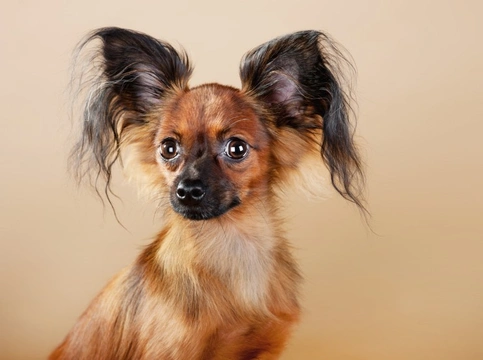
Are you looking for an unusual and unique toy terrier breed? Consider the Russian toy terrier
Toy dog breeds make up many of the dogs at the very top of the popularity list here in the UK, and there are a huge number of individual small dog types to choose from. A sub-type of the toy dog grouping is toy terriers, and these little dogs pack a lot of personality into their small forms, being as they are outgoing, usually lively, and very loving too.
If you have your heart set on owning a toy terrier breed and are starting to look around at the options, you might find yourself coming across some breeds that you have never even heard of before – like the Russian toy terrier.
Russian toy terriers aren’t hugely common in the UK, being ranked as the 135th most popular dog type out of a total of 241 – but they do have a strong and loyal following of owners and enthusiasts, and are a unique and unusual small breed that is definitely worth a second look.
If you are wondering if a Russian toy terrier is the right dog for you – or if you’ve only just heard about the breed and want to find out more – this article will outline the basic traits and temperament of the breed to get you started. Read on to learn more.
What is a Russian toy terrier?
A Russian toy terrier is a very small dog of the terrier type, which is also sometimes known by the name of the Russkiy toy. As the name implies, the breed was developed in Russia – although the breed’s founding stock hails from our own shores, being the English toy terrier.
The breed has a long history within their home country, but until the 1990’s, they were virtually unheard of elsewhere – and they are still uncommon within the UK, although they are gaining some traction as word of the breed spreads.
Is the Russian toy terrier a pedigree dog breed?
Within the UK, the Russian toy terrier isn’t classed as pedigree dog breed, and is not recognised by the UK Kennel Club. The population of dogs of the breed isn’t large enough to make them currently viable for consideration for registration, although they are recognised and registered with a number of other international dog breed registries including the American Kennel Club and the FCI, which is the largest pedigree dog registry worldwide.
How much do Russian toy terriers cost to buy?
The average advertised price of a Russian toy terrier in the UK is £632, which makes them more affordable than many of the more popular small and toy dog breeds. Interestingly, their relative rareness in the UK has not in its turn resulted in a very high average price for dogs of the breed, and the average sale cost of the Russian toy places them within the budget of most potential buyers.
However, because the Russian toy terrier isn’t hugely common, litters are often in great demand – which may mean finding a breeder and joining a waiting list for a future litter, and having to travel some distance to find one.
What do Russian toy terriers look like?
Russian toy terriers are very petite dogs, reaching an average height of anywhere between 20-28cm tall at the withers and weighing around 3kg. They are also delicate in build, being finely boned and very light.
They have pointed, delicate faces that usually sport an inquisitive expression, with large, alert eyes. Their very large, pointed ears – sometimes referred to as bats’ ears – give them an endearing and comical expression, and these ears may have a lot of feathering in and around them too.
Russian toy terrier coats come in two variants – either short coated with smooth fur, or longhaired with a fine, straight, silky coat that may have a slight wave to it but that still lies close to the body.
In terms of colours, Russian toy terriers can be found in red (which may have an overlay of either black or brown too), and either black, brown or blue with tan. Deep, rich coat colours are preferred within the breed to lighter or paler shades.
What sort of temperament do Russian toy terriers have?
Russian toy terriers share the very typical terrier trait of being small in size but big on personality, and they are active, lively and alert, as well as being prone to being quite energetic in short bursts. They are also very affectionate little dogs that love to have company, making them great lap dogs. Their need for exercise is not overly onerous, as they tend to be busy and lively out on walks but more than happy with a couple of half-hour walks each day.
They also make for good watchdogs, despite their small size, and will display a boldness often associated with much larger dogs if someone approaches their territory or tries to move in on their resources! However, they are not aggressive dogs, and respond quickly to a kind word or encouragement to come over and say hello, not tending to be speculative or wary with strangers.
They need a lot of love and affection, and won’t thrive if left on their own for long periods of time – and they do tend to suffer from separation anxiety if ignored. They share the normal terrier tenacity and might like to dig in the garden and worry at toys, but they are not generally challenging to keep within the home.
Even if you have never owned a dog of your own before, the Russian toy terrier might be a good fit, and they are personable and kind in nature, looking to their handler for direction. Their small size also makes them a good choice for apartments and urban homes, and they tend to be happy wherever they are if they have a familiar face around for reassurance.



